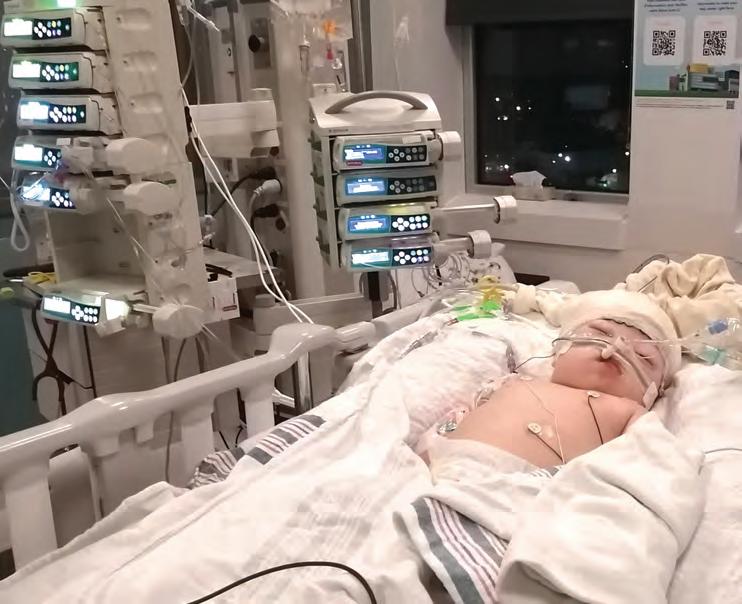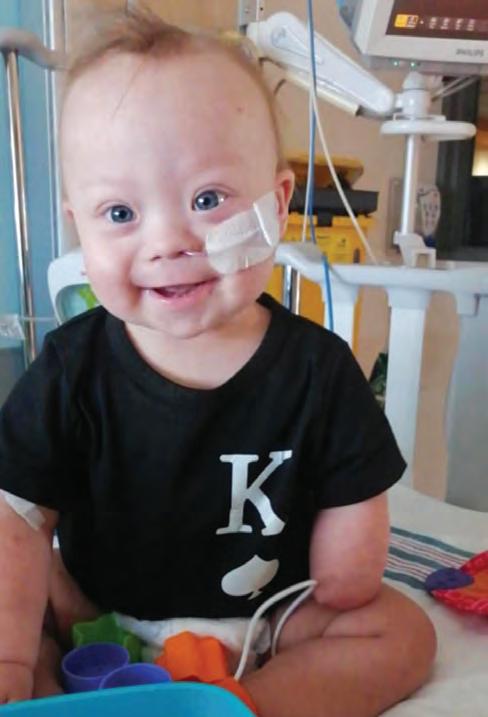
5 minute read
Type 1 diabetes: support to overcome challenges
by HME.MCH
By Christine Bouthillier
Jérémy's short life was turned upside down by type 1 diabetes when he was 13 months old. After overcoming a coma, an amputation and a long hospital stay, he is fortunately doing well today. A specialized support program at the Montreal Children's Hospital (MCH) made all the difference for the child and his family during the difficult journey that this disease can represent.
Jérémy, who has Down syndrome, was born prematurely but healthy. When he was 13 months old, everything changed. He started running a fever and then had trouble breathing. Once at his local hospital, it was discovered that his blood sugar was very high and his blood was acidic, confirming a new diagnosis of type 1 diabetes.
He was in such bad shape that he had to be resuscitated and then transferred to the Pediatric Intensive Care Unit at the MCH.
The child was in a coma and in critical condition. Six days after arriving at the MCH, his left forearm had to be amputated. The diabetes had made him so sick that a blood clot had formed in the artery of his hand.
Despite everything, Jérémy slowly began to improve. However, the challenges were far from over. The family now had to learn to live with the disease.

WELCOME ASSISTANCE
Type 1 diabetes is a chronic disease in which the body stops producing enough insulin or does not use it effectively to convert sugar into energy. To treat this disease, people with it must receive regular insulin injections based on their blood sugar level.
The ideal solution for many children with type 1 diabetes is an insulin pump, which automatically adjusts the dose based on the amount of sugar in the blood. It delivers insulin through a catheter placed under the skin.
Without a pump, a parent must calculate the dose themselves based on what the child will eat and their blood sugar level, which increases the risk of error. They must also administer the insulin with a pen and needle four to six times a day. With the pump, the catheter is changed only once every three days, which eliminates the need for multiple daily injections, allows for greater flexibility in meal times, stabilizes blood sugar levels and improves the patient's quality of life.
However, getting the pump is sometimes an uphill battle. You have to attend several training sessions, fill out numerous documents to be covered by the governmental Insulin Pump Access Program and prove that you are capable of handling such technology. Without help, the process can take six to nine months.
To support families like Jérémy's in this complex process, the MCH created an insulin pump support program over a year ago with a dedicated nurse practitioner.
“We want equity. Every child should have access to a pump in a timely manner, not just those whose parents are tech-savvy or more comfortable advocating for themselves,” explains Dr. Julia von Oettingen, a pediatric endocrinologist and Director of the Diabetes Clinic at the MCH.

LEARNING TO LIVE DIFFERENTLY
Within the program, nurse practitioner Sarah Tremblay-Rouleau helps families obtain pumps and provides education about the disease.
"With Dr. Annie Sbrocchi, Sarah taught me everything about how type 1 diabetes works. She helped me get a pump.
While Jérémy was in the hospital, she came to see us two or three times a week for training. She showed me how to plan my son's meals and how to use the pump, for example, how to fill the reservoir, remove the dressings, insert the catheter, etc. She is so kind and patient... She's wonderful!" says Julie Lefebvre, Jérémy's mother.
The child's daily life was transformed when he finally got access to an insulin pump, going from many injections a day to just a catheter change every three days.
“The pump has changed his life!” adds Julie.
However, given his young age, Jérémy could not receive the full dose of insulin. He is one of the few patients who must have diluted insulin. Sarah therefore had to adapt the pump's protocol to provide him with a personalized treatment.
After 52 days in the hospital, Jérémy was finally able to go home. Now two years old, he is doing well but still needs close monitoring. His mother cannot work because she has to note her son's meals carefully in order to enter the amount of carbohydrates he has eaten into the pump, a responsibility that the daycare cannot take on. She continues to call Sarah at least twice a week to make sure his type 1 diabetes is under control.
When Jérémy is ready to start eating a more varied diet, Julie will need further training, as the calculations will become more complex.
"I visited every division in the hospital with Jérémy. Everywhere we went, nurses, doctors and other specialists gave him exceptional care, while finding the words to reassure me and teach me about the disease," says Julie. "Above all, they showed me how to trust myself when I have to provide care alone at home, despite my fear of hospitals and injuries. They made me understand that I can do it. I am so grateful to all your staff. Thank you from the bottom of my heart!"


